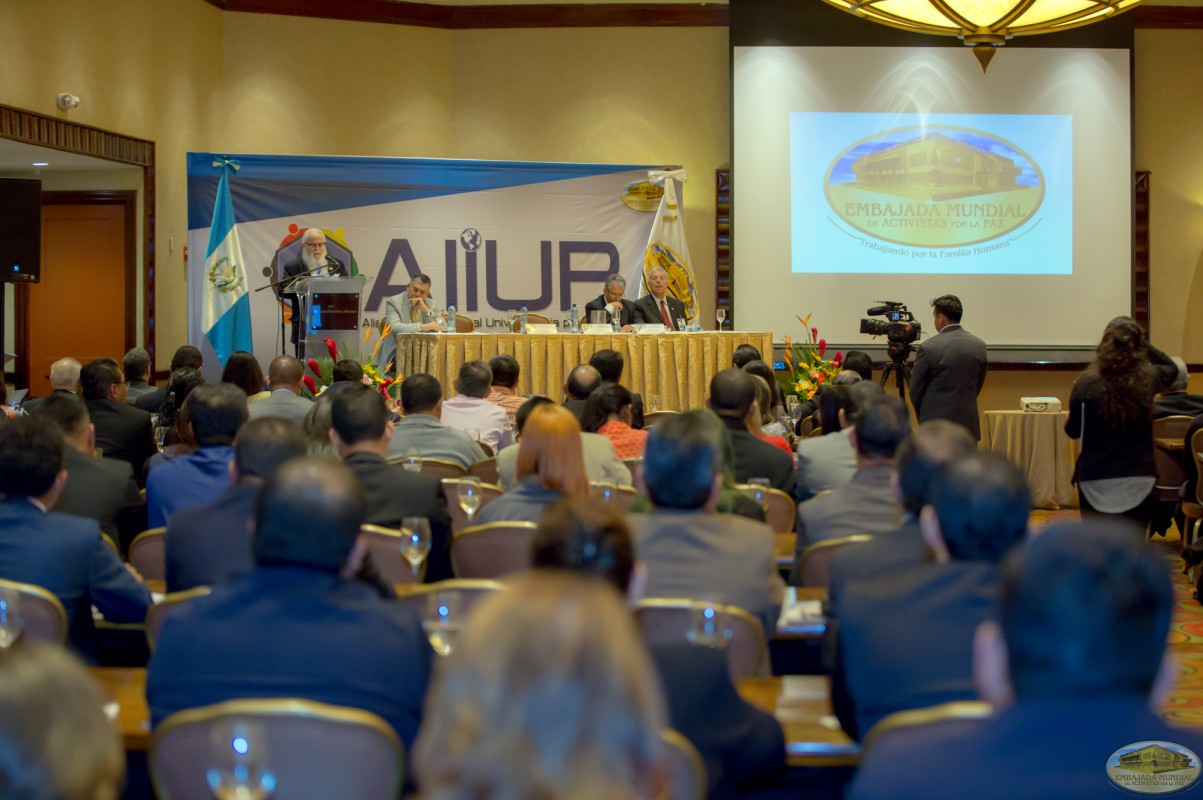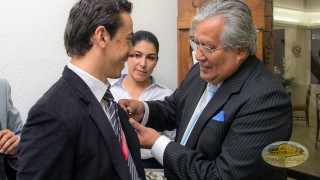“Challenges of Higher Education in Human Development and Society”
Distinguished academics turned to the call that the Global Embassy of Activists for Peace (GEAP) made for the 9th International Seminar “Challenges of Higher Education in Human Development and Society,” under the guideline of the International Alliance of Universities for Peace (ALIUP); a seminar that took place on the July 8th, 2016 at the Real Intercontinental Hotel in the City of Guatemala.
Rectors, deans, and the president of the Association of Rectors in the Caribbean and the Americas, coordinators of foundations, representatives of Government, of university extensions, and professionals of distinct areas, participated in the academic interchange of the two work tables about the “Contribution of the Chair for Peace in the formative process of the integral human being,” and “The focus of Higher Education in values, based on transformational leadership.”
The areas that the ALIUP promotes are aimed opening dialogue among universities, and the reflection upon the necessary changes of Higher Education to form people, not only intellectually prepared but integrally formed.

In his dissertation upon the “Contribution of the Chair for Peace in the formative process of the integral human being,” Dr. William Soto Santiago, executive president of the GEAP, quoted Plato saying: “With a good education man is a divine and docile creature, but without it, he is the most ferocious of animals. Education and teaching improve the good people and make the bad people good.” In this way, he indicated that education is capable of changing the mentality and actions of men. At the same time, he invited everyone to reflect upon: “What is the current objective of Higher Education? Since we see many prepared academic leaders attempting against the dignity of the human being.
“The social, political, economic and cultural changes, the crisis of human values, and above all spiritual ones, disintegrate society. They are situations that summon universities to reconsider the objectives of Education. Education must be more than a simple transference of knowledge to form professionals.”
Jose Adolfo Reyes Calderon, dean of the Faculty of Law and representative of the rectory of the University of the West, intervened during the first table with the presentation “Education in values in the struggle against terrorism and international conflicts, in the defense and promotion of human rights,” signaled:
“Education in values is a systematic, multidimensional, intentional, and integrated process, which guarantees the formation and development of the conscious personality. It is specified through the curricular and extracurricular. Higher Education must pay tribute to society with the formation of women and men capable of providing solutions (...) Education in values of university students is basic in the struggle against terrorism and international conflicts, in the defense and promotion of human rights.”
Dr. Luna Escudero, of Mexico, was in charge of the second presentation, president of the Association of Rectors of the Caribbean and the Americas, “Education and Development”, emphasizing that in this globalized world existence seems possible if it is fulfilled and successful if you have the acquisitive power.
“We live in an economy of importance with its cultures of importation. We live in a banal kingdom, of arrogance,” which should be given a solution to have better values and a quality of life.

Dr. Constantino Riquelme, of Panama, explained “The internationalization of the solidarity of Higher Education for the search of an improvement of the quality of education.” In his intervention, he pointed out the disproportion of Governments in the investment of the educational system since more is invested, for example, in security than education.
“We must have one propose: a vision of educational quality in our States and universities; to find interinstitutional mechanisms to minimize inequality.”
Alvaro Folgar, of the University Administration of the San Carlos University in Guatemala, participated with the lecture “The contribution of university extension in the approach of social challenges” emphasizing that the San Carlos University in Guatemala is contributing in development and social peace with the presence in more than 70 instances in the State of Guatemala.
“The incident and presence agenda of public and state universities, is fundamentally oriented to human development in Guatemala. Education is fundamental in development, but without development there is no education. For which both must have a dialectical relationship in the social dynamic.”

The general administration of the GEAP, led by Gabriela Lara, stated that within its progress, ALUIP has obtained the International Seminars carried out in Paraguay, Colombia, Argentina, Venezuela, and Bolivia, among others, along with the incorporation of universities in countries like Mexico, Panama, Honduras, Nicaragua, and others, that form part of this network that has as a goal to integrally educate today's students, but future governors, scientists, and educators of peace.


